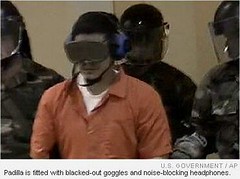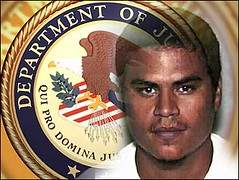Home / Terror Trials
Surprise in the case against former AUSA Richard Convertino, who prosecuted the fiasco of the Detroit terror trial. He's been acquitted on all counts.
He was charged with obstruction of justice for concealing evidence in the case.
Three defendants were convicted during the terror trial and the case was later reversed for prosecutorial misconduct. How did he get acquitted? I have no idea, but here was his defense:
During an emotional closing to the four-week trial, William Sullivan, the attorney for Convertino, pointed out that the terror suspects weren’t retried and said that the government had substituted Convertino and Smith for them.
TalkLeft covered the Detroit terror trial and Convertino extensively. See here, here and here as background.
(1 comment) Permalink :: Comments
The government's most celebrated effort to prosecute a Muslim charity for financing terrorism ended in a bust.
A federal judge declared a mistrial on Monday in what was widely seen as the government’s flagship terrorism-financing case after prosecutors failed to persuade a jury to convict five leaders of a Muslim charity on any charges, or even to reach a verdict on many of the 197 counts. ...The case involved 197 counts, including providing material support to a foreign terrorist organization. It also involved years of investigation and preparation, almost two months of testimony and more than 1,000 exhibits, including documents, wiretaps, transcripts and videotapes dug up in a backyard in Virginia.
The only verdicts returned were acquittals. Prosecutors are vowing to present their (mostly nonexistent) case to a second jury, apparently hoping that new jurors will be cowed by the words "terrorism" and "Muslim" and will overlook the absence of evidence that the charity financed anything other than charitable works.
The implications of the government's strategy for dealing with Muslim charities are stunning:
(1 comment, 287 words in story) There's More :: Permalink :: Comments

Jose Padilla has sued 59 goverment officials, including Donald Rumsfeld, over his mistreatment during his confinement in the S.C. military brig. His primary claim: psychological torture.
He's not doing it for the money: He's only asking for $1.00 damages from each official:
"Mr. Padilla suffered gross physical and psychological abuse at the hands of federal officials as part of a scheme of abusive interrogation intended to break down Mr. Padilla's humanity and his will to live," the 30-page complaint says.
"The grave violations suffered by Padilla were not isolated occurrences by rogue lower-level officials," the suit says. Besides Mr. Rumsfeld, it names Defense Secretary Robert Gates, former Attorney General John Ashcroft, former Deputy Secretary of Defense Paul Wolfowitz, and former Defense Intelligence Agency Director Lowell Jacoby, among others, who "personally ordered and/or approved Mr. Padilla's detention and interrogation program."
Related: Lindsay of Majikthise has a new article in In These Times, Perverse Justice, questioning whether detainees who are subjected to long periods of extreme isolation can receive a fair trial.
(40 comments) Permalink :: Comments
Kelly Anne Moore was the chief of the Violent Crimes and Terrorism Section in the Brooklyn United States Attorney’s Office from 2002 to 2006. One of the cases she prosecuted was that of two Yemenis,including Sheik Mohammed Ali Hassan al-Moayad,who were charged and convicted of conspiring to send money from Brooklyn, NY to members of al Qaeda and Hamas to support terrorist activities. One was sentenced to 75 years and the other to 45 years. Both are now serving their sentences at Florence's Supermax in Colorado.
Ms. Moore is now in private practice. As she (and others who have tried terrorism cases) know, the U.S. courts are just fine for the job. We don't need special National Security Courts or military tribunals.
In an op-ed in today's New York Times, Ms. Moore writes:
Besides terrorists, the Justice Department has successfully prosecuted Ku Klux Klan bombers, members of violent groups like the Weathermen in the 1960s and ’70s, and members of Italian organized crime in the ’80s and ’90s. The same system has been used repeatedly against complex drug trafficking and human trafficking syndicates, many of which operate primarily overseas.
I'd add to that list those charged and convicted in the Oklahoma City Bombings.
Here are some of the points she makes:
(32 comments, 477 words in story) There's More :: Permalink :: Comments

I was out of town today and missed the verdict. Since getting home, the news is all about the miners in Utah. So without benefit of having seen live coverage or later analysis, first let me say I agree with TChris:
Whether or not the verdict is correct, the prosecution proves that violations of the law can be addressed in criminal courts. It was never necessary to treat Padilla as an "enemy combatant" or to attempt to deny his right to a jury and to all the other rights that should attend a criminal prosecution.
Now, let me add: I'm dismayed that a jury would come back with a guilty verdict after a day and a half of deliberation in a trial where the evidence took three months to present.
It took 12 Miami-Dade jurors just 11 hours to reach their unanimous verdicts, despite a complex body of evidence that included hundreds of FBI phone wiretaps introduced during the three-month federal trial.
It takes longer than that to comprehend the jury instructions. The instructions in Padilla's case were 42 pages long and are available here (pdf). The jury's job is to determine whether the government has proved each and every element of the charged crimes against each defendant. The elements of the crimes are contained in the jury instructions. They are to apply the law as given in the instructions to the evidence presented at trial.
More...
(162 comments, 574 words in story) There's More :: Permalink :: Comments
The sorry saga of Jose Padilla's prosecution has ended with a guilty verdict. Had the government prosecuted Padilla as a criminal from the start, instead of insisting that he was an "enemy combatant" before flip-flopping to avoid Supreme Court review of its claim, it would not have taken 3-1/2 years to reach this point.
[Padilla] was finally added to the Miami terrorism support indictment in late 2005 just as the U.S. Supreme Court was poised to consider President Bush's authority to continue detaining him.
Padilla's co-defendants were also convicted. Whether or not the verdict is correct, the prosecution proves that violations of the law can be addressed in criminal courts. It was never necessary to treat Padilla as an "enemy combatant" or to attempt to deny his right to a jury and to all the other rights that should attend a criminal prosecution.
TalkLeft background on the Padilla case is collected here.
(6 comments) Permalink :: Comments

Bump and Update: Deliberations begin Wednesday in the trial of Jose Padilla and his co-defendants.
Here are the jury instructions (pdf), made available on PACER Tuesday.
******
Defense Closing Arguments in Jose Padilla Trial
Lawyers for accused terrorism supporters Jose Padilla and co-defendant Kifah Wael Jayyousi gave their closing arguments today.
Shorter version from Jose Padilla's lawyer: He was a student, not a terrorist. As to the mujahedeen form with Padilla's fingerprints:
The critical piece of prosecution evidence is a "mujahedeen data form" Padilla allegedly filled out in July 2000 to attend an al-Qaida training camp in Afghanistan. The form bears seven of his fingerprints, but Caruso said they are found only on the first page and the back of the final page — consistent with Padilla simply handling the form, rather than writing on it.
Of the 3,000 taped telephone calls, Padilla's voice was only on 7 of those introduced at trial.
As to the use of code words, Padilla didn't use any on the taped calls. The Government wants the jury to believe that when the other two defendants used words like "tourism" and "football" they meant "jihad" and that the words "eggplant" and "zucchini" were references to military weapons and supplies.
Bill Swor, Jaylousi's lawyer, told the jury the government was fear-mongering.
More....
(2 comments, 428 words in story) There's More :: Permalink :: Comments
James Ujaama was one of the early terrorism suspects who took a deal to avoid a big jail sentence. I followed his case extensively at the time because he was arrested in Denver.
The Government initially alleged he scouted for terror camp locations in Bly, Oregon. He ended up pleading guilty only to providing cash, computers and fighters to the Taliban, in exchange for his cooperation against others. He was sentenced to two years, about one of which had been served in pre-trial detention. He's been on supervised release since 2004.
The Government was counting on Ujaama to testify at the trial of London cleric Abu Hamza al-Masri.
Ujaama, it seems, got cold feet and split to Belize using a fake Mexican passport.
On Friday, the Judge in Seattle where he pleaded guilty in 2003 revoked his plea deal. Today, in federal court in Manhattan, he pleaded guilty to the original terrorism charges lodged against him and now faces up to 30 years when sentenced.
On a related note, I still think that Condi Rice confused Ghost detainee Khaled el-Masri (also spelled al-Masri, a German shoe salesman) with the London Cleric and only ordered his release after the cleric al-Masri was arrested. By then, el-Masri had been in jail for five months.
Among the more curious details of the mix-up, if there was one: al-Masri the cleric, has one eye and a hook for hands. You would think someone would have noticed the difference between him and Khaled el-Masri before five months went by.
(2 comments) Permalink :: Comments

The Government gave its closing argument today in the terrorism trial of Jose Padilla. The AP reports intent is key.
Was Padilla the "star recruit" of a terrorism support cell run by Adham Amin Hassoun and Kifah Wael Jayyousi whose ultimate goal was violent establishment of fundamentalist Islamic regimes around the world, as prosecutors claim?
Or did Hassoun and Jayyousi intend to provide relief and charity for innocent Muslims suffering in global conflict zones? And was Padilla simply an American who had recently converted to Islam and traveled overseas not for terrorism but to learn Arabic and the Quran?
The lawyer for one of the three defendants, Adham Amin Hassoun, also gave his closing today:
But Hassoun attorney Kenneth Swartz said in the first of three defense closing statements that "this case is all about speculation. It is not about proof of a crime. There is no intent to murder. The only intent is to provide relief."
Lawyers for Kifah Wael Jayyousi and Jose Padilla will close tomorrow. More on today's defense closing is here.
The Christian Science Monitor takes a long look at the case in tomorrow's paper. It says
Despite warnings, officials used 43 months of severe isolation to force Jose Padilla to tell all he knew about Al Qaeda.

The defense begins its case today in the terrorism trial of Jose Padilla and two codefendants.
How big are the holes in the case? Journalist Lew Z. Koch, writing at Firedoglake, counts the ways. He concludes:
Ashcroft, then Comey, and now Gonzales, Frazier, Shipley, Killinger and Pell have built a case on fantasy, supposition, prejudice and fear mongering. Can the defense make the jury see the shocking inadequacies of the prosecution’s case?
The Christian Science Monitor asks, Without a Plot, Is Padilla Guilty?
More....
(8 comments, 197 words in story) There's More :: Permalink :: Comments

The Government has rested its case in the Miami terrorism trial of Jose Padilla and his two co-defendants.
The Southern District of Florida blog has a wrap-up of coverage.
Journalist Lew Koch has been writing about the case for Firedoglake. His latest is here, focusing on the jurors playing dress-up.
More...
(9 comments, 184 words in story) There's More :: Permalink :: Comments


The Sixth Circuit's decision last week to dismiss a lawsuit brought over the NSA warrantless wiretapping program doesn't end the litigation in the courts.
At least one other suit is pending, and standing to bring the lawsuit isn't at issue and and thus is unlikely to be the basis for dismissal.
Readers may remember that Albany, NY defense lawyer Terry Kindlon, raised a similar challenge to the wiretapping in United States v. Aref (the so-called "terrorism" case from the Northern District of New York).
In December, 2005, while Aref's case was pending, Terry learned from a New York Times article that his client had been tapped by the NSA. He immediately made some demands, followed up with some motions and, basically, got nowhere (although he did enjoy receiving a Government pleading containing a caption at the top of the first page, a signature at the bottom of the third page, and nothing but blank space (marked CLASSIFIED) in between).
More...
(3 comments, 474 words in story) There's More :: Permalink :: Comments
| << Previous 12 | Next 12 >> |







